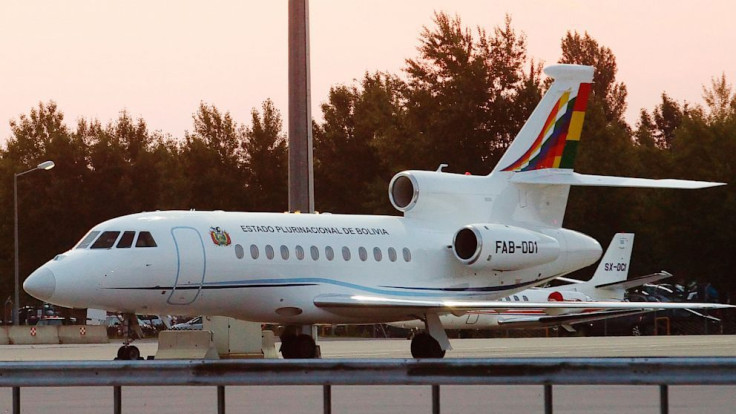
Bolivian President Evo Morales' presidential plane is finally heading back to Bolivia on Wednesday morning after a series of diplomatic incidents. On his way home from a summit of oil-producing countries in Moscow on Tuesday night, Morales said, French, Spanish, Portuguese and Italian governments suddenly cancelled permission for his plane to access their airspaces, allegedly out of the suspicion that NSA leaker Edward Snowden was on board. The four governments denied that they had done so, and an Austrian official told the Associated Press that he could not comment on Morales' accusation.
In a statement released by the president's office on Wednesday morning, Morales "thanked Austria for its solidarity" in letting him make a stopover, reserving his venom for the governments of France, Portugal, Spain and Italy for having forced the reroute. He felt, he said, "like a kidnapped person for almost 13 hours".
"I can't understand why France, Italy, Portugal and Spain would call for me to be stopped because I was carrying Mr. Edward Snowden," he said, adding that Snowden was not a suitcase to be picked up and brought on board a plane.
RELATED: Will Nicolas Maduro's Presidential Plane Be Snowden's Way Out?
Bolivia's ambassador to the United Nations, Sacha Llorenti Soliz, gave an even more blunt account of the events than Morales, telling reporters in Geneva, "We're talking about the president on an official trip after an official summit being kidnapped." According to Reuters, Llorenti added, "We have no doubt that it was an order from the White House. By no means should a diplomatic plane with the president be diverted from its route and forced to land in another country."
There also emerged distinct accounts of what happened after the Bolivian president's plane landed in Vienna. Austria said that after allowing Morales to land and during the 13-hour stopover, officials searched Morales' plane for Snowden and came up empty-handed. "Our colleagues from the airport had a look and can give assurances that no one is on board who is not a Bolivian citizen," Deputy Chancellor Michael Spindelegger told reporters at the airport in Vienna.
RELATED: Ecuador President Rafael Correa Warns He Won't Accept 'Blackmail' Over Snowden
Evo Morales said he refused Austrian authorities access. "I couldn't allow them to search the plane, because I'm no criminal, and second, under international law it's an official plane. The President has inviolable immunity, a right to travel in any part of the world. I denied them out of dignity, I have the obligation to defend my dignity and sovereignty because it isn't just an offense to the President, but to all of the [Bolivian] people, to the whole region of Latin America."
European Union Transport spokeswoman Helen Kearns told the Associated Press that national governments have the authority under international law to allow or refuse planes access to their airspace.
RELATED: Court Rules That Evo Morales Can Run For Third Term
The AP reports that during the stopover in Vienna, the Spanish ambassador to Austria, Alberto Carnero, visited the airport and asked Morales to go have a coffee inside the plane. Morales said he believed Carnero did so in order to inspect the plane. Spanish authorities later gave the Bolivian president authorization to stop in Spain before crossing the Atlantic.
French government spokeswoman Najat Vallaud-Belkacem told the AP that the plane "was authorized to fly over French territory" but wouldn't say whether there had been an initial refusal Tuesday night amid rumors over Snowden's possible presence on the plane. American officials would not comment directly and Italian officials were not available to speak on the matter.
Snowden, meanwhile, is apparently still in the Moscow international airport. He has applied for asylum with 21 countries. None have granted him it thus far, with many saying he needs to be on their territory in order for his request to be considered. Morales told Russian television that his country was ready to analyze a request but that none had yet been submitted.
© 2025 Latin Times. All rights reserved. Do not reproduce without permission.




